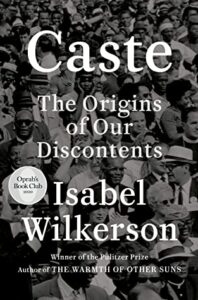Caste: The Origins of Our Discontents
By: Isabel Wilkerson
Isabel Wilkerson’s book Caste explores the similarities between the different caste systems in India, America, and Nazi Germany. According to Wilkerson, “caste is the granting or withholding of respect, status, honor, attention, privileges, resources, benefit of the doubt, and human kindness to someone on the basis of their perceived rank or standing in the hierarchy.” Racism and casteism do overlap, she writes, noting that “what some people call racism could be seen as merely one manifestation of the degree to which we have internalized the larger American caste system.”

Ms. Wilkerson draws out the links between how Black people are — and have always been — treated in the United States and in particular how Indians in higher castes treat those individuals in lower castes. We chose this book as part of our commitment to better understand the roots of racial inequality in America, as well as what steps we can take to make sure we are part of the solution, not the problem.
Part of our discussion focused on how much of the American history that is taught in schools tends to leave out events that followed the Emancipation Proclamation, and just how poorly Black Americans have been treated historically. We discussed what our individual and collective positions in the caste hierarchy give us the opportunity to do that others cannot. We brainstormed ways to change that.
How can Thrivner stand up to the caste system? Specifically, we talked about changes to our hiring practices for full-time employees, consultants, and vendors. Ideas abound this year about how we can dissolve the caste system in our country. It may begin by unlearning a lot of what we’ve been taught, committing to revolutionize the systems and institutions we interact with, and destroying our preconceived notions about who people are. Humans are humans.

Recent Comments